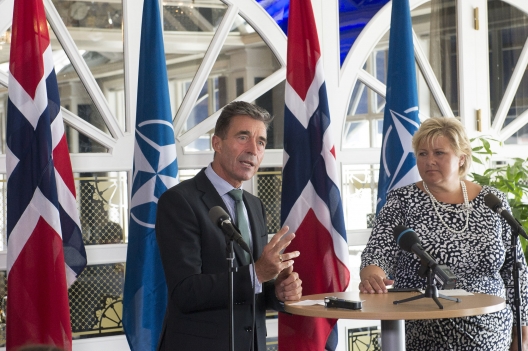 Norway is in many ways a unique NATO member that currently finds itself in an advantageous position in comparison to its fellow European allies. First, Norway largely escaped the great recession brought on by the financial crisis in the United States and the Euro crisis across the continent. Norway’s bounty of energy resources also means that it has been able to spare its armed forces from drastic cuts, which have been the order of the day across much of the Alliance. Indeed, Norway recently increased defense spending, and is procuring high-end capabilities such as the F-35 fighter jet, a new class of Aegis frigates, and Oslo is also eyeing a new class of conventional attack submarines.
Norway is in many ways a unique NATO member that currently finds itself in an advantageous position in comparison to its fellow European allies. First, Norway largely escaped the great recession brought on by the financial crisis in the United States and the Euro crisis across the continent. Norway’s bounty of energy resources also means that it has been able to spare its armed forces from drastic cuts, which have been the order of the day across much of the Alliance. Indeed, Norway recently increased defense spending, and is procuring high-end capabilities such as the F-35 fighter jet, a new class of Aegis frigates, and Oslo is also eyeing a new class of conventional attack submarines.
Second, while domestic politics in many nations of the Alliance have become increasingly turbulent (another consequence of the recession and the onset of austerity), Norway has managed to keeps its politics civil, which enables effective decision making and political leadership. This was on display as the Norwegian government and the people of Norway calmly, resolutely, and constructively responded to the attack by a right-wing extremist in the summer of 2011, which killed close to 70 people.
These factors have enabled Oslo to take on a leadership role within the broader transatlantic security community, and have an impact that is bigger than what one would expect from a country of only 5 million people. Norway has been a consistent contributor to the ISAF mission in Afghanistan, and was also an early contributor to OPERATION UNIFIED PROTECTOR over Libya in 2011. Indeed, together with Denmark (with a combined force of only 12 F-16s), the two Nordic allies flew close to a quarter of the strike missions under UNIFIED PROTECTOR during the first half of the operation. More recently, Norway played a direct role in transporting the Assad regime’s chemical weapons out of Syria for destruction.
Norway has also been an active player in the transatlantic community on the political front. Oslo is quite proud of its constructive relationship with Russia in the high north, but Norway is far from a push-over in this regard. Norway hopes to leverage this relationship for the broader transatlantic community, although it has proven harder going in recent months due to the Ukraine crisis. Furthermore, unlike many European nations, Norway actually clearly signaled an understanding, and support for, the US pivot to Asia. This does not mean that Norway does not seek to have the United States engaged in European security, but Oslo’s position on this issue signals a rather mature approach to how to engage with the United States on the world stage. Norway further cemented its position by deploying an Aegis frigate to the US-led Rim of the Pacific exercise off Hawaii earlier this year.
Finally, strengthening NATO’s collective defense and deterrence tool set has been on the Norwegian agenda for years, and now seems to have been confirmed by the Ukraine crisis. With all this in mind, it is not so surprising that Norway’s former Prime Minister, Jens Stoltenerg, is slated to become NATO’s next Secretary General this fall.
What Norway seeks from the Wales Summit has a decidedly defense and deterrence ring to it. Oslo would like to see an Alliance that has more in-house regional expertise (in order to better foresee emerging security challenges, such as the war in Georgia in 2008, the Ukraine crisis, and the Syrian civil war), along with a more regional focus for NATO’s command structure. Norway would also like to see a renewed focus on training and exercises within the Alliance, and Oslo hopes to host a major NATO exercise in the high north as early as next year. Finally, Norway is also advancing a concept where the NATO Response Force would take on a role as a mobile force for defense and deterrence contingencies, not unlike the ACE mobile force of the late 1980’s and early 1990’s.
But not all Allies will immediately agree with Norway’s perspectives. For example, Norway wants NATO to take a larger interest in the Arctic, something that both Ottawa and Copenhagen are resisting, due to the fear that a NATO role in the Arctic would heighten tensions in the otherwise, for now, peaceful region. Norway argues that an occasional NATO presence in the region would actually solidify the peace and stability there. Furthermore, Norway is lukewarm on both NATO enlargement and the further deepening of partnerships (the latter to the chagrin of Norway’s two NATO partner neighbors, Sweden and Finland).
The Ukraine crisis and an increasingly assertive Russia will make it likely that at the Wales Summit, the Alliance will embrace many of Norway’s objectives. And while Stoltenberg will not represent Norway in his new capacity as NATO Secretary General, he could very well bring a Norwegian sensibility for pragmatism into an Alliance that is still adjusting to a post-Afghanistan world.
Magnus Nordenman is deputy director of the Brent Scowcroft Center on International Security.
Image: Secretary General Anders Fogh Rasmussen and Norwegian Prime Minister Erna Solberg, August 14, 2014 (photo: NATO)
